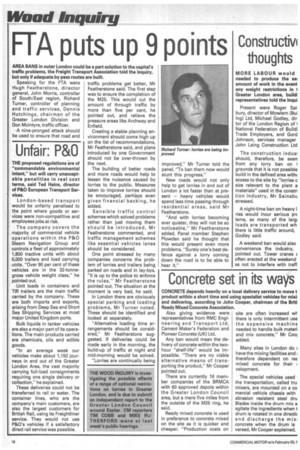FA puts up 9 points
Page 12

If you've noticed an error in this article please click here to report it so we can fix it.
AREA BANS in outer London could be a part solution to the capital's traffic problems, the Freight Transport Association told the Inquiry, but only if adequate by pass routes are built.
Speaking for the FTA were Hugh Featherstone, director general, John Morris, controller of South/East region, Richard Turner, controller of planning and traffic services, Dennis Hutchings, chairman of the Greater London Division and Don McIntyre, traffic officer.
A nine-pronged attack should be used to ensure that road and traffic problems get better, Mr Featherstone said. The first step was to ensure the completion of the M25. This would cut the amount of through traffic by more than five per cent, he pointed out, and relieve the pressure areas like Archway and Enfield.
Creating a stable planning environment should come high up on the list of recommendations, Mr Featherstone said, and plans introduced by one Government should not be over-thrown by the next.
The building of better roads and more roads would help to lessen the nuisance caused by lorries to the public. Measures taken to improve lorries should be encouraged, perhaps even given financial backing, he added.
Sensible traffic control schemes which solved problems rather than just moving them should be introduced, Mr Featherstone commented, and traffic management schemes like essential vehicles lanes should be considered.
One point stressed by many companies concerns the problem of lorries and trailers being parked on roads and in lay-bys. "It is up to the police to enforce the rules," Mr Featherstone pointed out. The situation at the moment is very bad, he said.
In London there are obviously special parking and loading problems, Mr Turner noted. These should be identified and looked at separately.
"Alternative loading time arrangements should be considered," Mr Featherstone suggested. If deliveries could be made early in the morning, the build-up of traffic at night and mid-morning would be solved.
"Lorries are continually being improved," Mr Turner told the panel. "To ban them now would stunt this progress."
New roads would not only help to get lorries in and out of London a lot faster than at present — heavy vehicles would spend less time passing through residential areas, said Mr Featherstone.
"And with lorries becoming ever quieter, they will not be so noticeable," Mr Featherstone added. Panel member Stephen Plowden said he thought that this would present even more problems. "Surely one's best defence against a lorry coming down the road is to be able to hear it."


















































